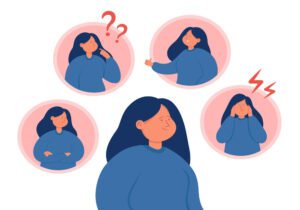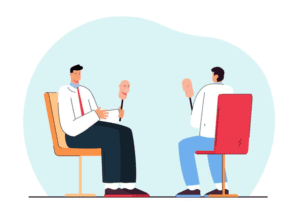Psychologists vs. Psychiatrists – What’s the Difference?
This article has been researched and written by Nayla Daou. AI has not been used in producing this article.
Clients shouldn’t have to jump through hoops to understand who the perfect candidate is for treating their emotional and/or behavioral struggles. Yet, understanding the type of provider you should see during times of need can become quite confusing. At ClearMinds, we realize the world of professional providers can be challenging to navigate and we’re here to help you understand the differences between a psychologist and a psychiatrist.
Psychologist training and education
The training and education required to become a psychologist can vary depending on location, but typically it requires the minimum of a master’s degree in psychology, which requires six years of higher education or a Ph.D. or Psy.D., which requires nine years of higher education. A psychologist with a Ph.D. or Psy.D. can be referred to as a “doctor.” However, they are not medical doctors who prescribe medicine, but doctors who provide psychotherapy. Psychologists require professional licensure from the local health authority.
Psychiatrist training and education
The training and education required to become a psychiatrist can also vary depending on location. Typically, it requires an average of 12 years of higher education. After a psychiatrist earns their bachelor’s degree, they attend medical school for four years, which is followed by a four-year residency, and in some cases, a fellowship for further training. After schooling and passing a medical licensure exam, a psychiatrist is permitted to prescribe medication.
Psychotherapy is most often conducted with a psychologist to alleviate emotional and behavioral symptoms, such as depression, anxiety, stress, eating disorders, and relationship issues, etc. Most often, people who are struggling should first seek out psychologists for an assessment or to begin psychotherapy. If their condition is determined to benefit from medication, their psychologist will then refer them to a psychiatrist. Typically, psychologists also administer assessments to help understand a client’s thoughts, feelings, and behaviors. These tests are then used to help develop a treatment plan to suit an individual’s unique needs. Depending on an individual’s needs, sessions may be needed one time per week or more. Additionally, depending on the severity of the symptoms, psychology appointments can work in conjunction with psychiatrist appointments.

Treatment with psychiatrists
One of the major differences between a psychologist and a psychiatrist is that psychiatrists can prescribe medications to their clients. Although they can also offer assessments and psychotherapy, psychiatrists typically work alongside a psychologist to provide medications, while the psychologist manages the weekly therapy sessions to resolve core issues contributing to the distress. It is not uncommon for the team to meet on a regular basis to brainstorm treatment plans for their shared clients.
Explore your treatment options with Clearminds
Are you trying to determine whether you or your loved one would benefit from seeing a psychologist, a psychiatrist, or both? You do not have to face these challenging times alone, the professionals at Clearminds are here to help. Our professional psychologists and therapists are here to help support you as you navigate your mental health journey on your path to living your most fulfilling life.
Reach out to schedule your consultation today.
Navigating Compassion Fatigue in the Digital Age: A Call to Prioritize Mental Well-Being
Amid the constant stream of information and images that flood our screens, the toll on our mental well-being can be …
The Link Between Anxiety and Overeating
All of us have encountered moments of stress and unease throughout our lives. These feelings of anxiety not only bring…
10 Steps To Fix A Toxic Relationship
Every relationship has its fair share of ups and downs, but when toxicity creeps in, it can become a serious challenge. Toxic relationships can be emotionally draining and detrimental to our overall …
Exploring the Benefits of EMDR Therapy for Anxiety and Depression
Anxiety and depression are two of the most common mental health disorders worldwide, affecting millions of people every year. While traditional talk therapy and medication can be …
Health Effects of Untreated Depression
It’s very common to feel sadness at one point or another in our life. Depending on your specific circumstances, you may even feel …
Psychologists vs. Psychiatrists – What’s the Difference?
Clients shouldn’t have to jump through hoops to understand who the perfect candidate is for treating their emotional and/or behavioral struggles. Yet, understanding the type of provider you should see during …
Gentle Parenting: What is it and How to Try it Yourself
When it comes to raising children, no one has all the answers. Every parent and child have unique challenges and needs. Navigating these individual circumstances along with ever-changing environments, such as school …
How to Improve Your Relationship with Your Children – A Psychologist’s Guide
The modern family’s lifestyle leaves us shuffling from school to sports practice, family events, visiting friends, and everything in between. As society evolves to become more on-the-go and technologically advanced, w…
Tips for Communicating With Someone Who is Depressed
Knowing what to say to someone who is struggling with depression can be challenging. Perhaps you are afraid you might say the wrong thing. Or maybe you will say something that makes their day even worse? Maybe you fee…
Who Can Benefit From Couple Counseling?
Relationships are far from perfect. Each person brings his or her own ideas, values, opinions, and personal history into a relationship, and they don’t always match their partner’s. Those differences don’t necessaril…











